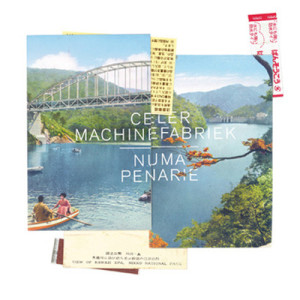
Format: 7"
Label: Self released
Release date: 4/30/12
Track list:
Side A
1 Numa
Side B
2 Penarie
Release description:
After the release of their first 7-inch, ‘Maastunnel/Mt. Mitake’, Will and Rutger decided to make it a series, and continue with another. ‘Numa/Penarie’ is the second collaboration, containing all-original audio pieced together from snippets of much longer source material. The artwork is a collage of old postcards from Jimbocho in Tokyo, and the single is again accompanied with two beautiful videos by Marco Douma.
Press reviews:
Boomkat
Tokyo resident Celer and Dutchman Machinefabriek enjoyed making that lovely ‘Maastunnel’ 7″ so much that they decided to continue working together on a series of 7″ platters. ‘Numa / Penarie’ is their 2nd pair of works and follows very much in that blissed-out, abstracted form, trimming down longer experiments into bijou ambient treats. A-side ‘Numa’ emerges from a chrysalis of shimmering tones into a more heavy set subbass organism glowing with lushly harmonised pads. B-side’s ‘Penarie’ diffuses what sounds like warped brass into stereo swirling arrangement before subsiding into plangent chords sounding like the peal of wedding bells heard from miles away.
Norman Records
This is part two of a three part series that sees Celer lad (Will Long) collaborate with Machinefabriek lad (Rutger Zuydervelt) – something that a lot of people seem to keen on hearing. I believe this is also part of a video project with collaborator Marco Douma making vids for each piece. Haven’t seen the vids so some context may be lost but as a stand alone 7”, it’s pretty decent.
It’s on the usual ambient tip with subtlety being the order of the day. Haunting synths drift aimlessly on ‘Numa’ before focusing themselves with an abrupt thump and petering out in a digital frenzy to be replaced by the initial flow of ambient choral synth tones. Flip it and ‘Penarie’ picks up where ‘Numa’ left off – you know, ambiently. This side really reminds me Eno’s early ambient forays and again makes great use of choral synthesis to envelope the listening in warm and inviting tone. Very CHILL. Very ASTRAL. You know the score. Ltd. to not very many and won’t be around long enough for you to ponder it so you might as well order now. Thank you drive thru.
Textura
Clearly satisfied by the outcome of their first seven-inch release, Maastunnel / Mt. Mitake, Will Long and Rutger Zuydervelt return for another installment, this one similar in concept and titled Numa / Penarie. Put together in Tokyo and Rotterdam earlier this year, the two tracks contain original sound elements stitched together from longer source material, and the release is enhanced by its postcard collage presentation and two complementary videos created by Marco Douma.
The tracks themselves are a contrasting pair, the first “Numa” very much in the Celer tradition in fashioning a mood of becalmed iridescence, even if some measure of turbulence briefly intervenes halfway through its five-minute run. “Penarie” immediately distances itself from the other in opening with horn-like synth flurries, though it, too, gravitates repeatedly in the direction of soothing splendour. In both pieces, one often witnesses an ongoing oscillation between the ambient stylings of Celer and the rougher textural play of Machinefabriek. Needless to say, that’s a good thing, as the collaborators’ respective tendencies render the material less homogenous and predictable than it otherwise might be.
Douma’s videos form a nice part of the package as they evolve in accordance with changes in the musical textures—as the music becomes grainier, so too does the video display. “Numa” offers a logical analogue to the musical material as it’s abstract in nature but powerfully evocative, with the visual content suggestive of sunlight reflections on rippling surfaces and showing geometric shapes viewed through a prismatic mist. By contrast, real-world elements, such as electrical towers and hydro wires, appear more identifiably during “Penarie,” though the video retains the dream-like quality of “Numa.”
Music Won’t Save You
Due compositori prolificissimi e avvezzi alle lunghe durate alle prese con il difficile esercizio della concisione: alla fine dello scorso anno, Will Long e Rutger Zuydervelt hanno intrapreso una collaborazione, dapprima sfociata nei due brani di “Maastunnel/Mt. Mitake” e alla quale viene adesso fornito stabile seguito in quella che sembra destinata a essere una serie di 7” in vinile.
I due brani di “Numa/Penarie” provengono da una serie di più articolate registrazioni, condensate in dieci minuti che mantengono fede alle loro componenti d’origine, evidenziando da un lato le impalpabili texture dell’artista americano e dall’altro le sperimentazioni analogiche di quello olandese.
Lungi dal costituire rappresentazioni brevi ma monolitiche, i due brani seguono un percorso di continua trasformazione: in “Numa” tremule ondulazioni raggiungono il grado di saturazione per poi venire puntellate da qualche pulsazione e da variopinti detriti sonori, mentre le più evidenti tastiere della prima parte di “Penarie” lasciano gradualmente spazio a modulazioni vaporose e quasi romantiche.
Si direbbe dunque un esercizio pienamente riuscito, che tuttavia potrebbe suscitare qualche interrogativo sull’enorme mole di produzioni di entrambi gli artisti, che qui dimostrano di saper concentrare addirittura in miniature di pochi minuti molto di quanto solitamente espresso in dischi interi.
Wajobu
Numa/Penarie are more obscure experiences. Numa is almost like a collection of sounds experienced throughout the day; clusters of lights buzzing, bell-like sounds, subways braking, jets taking off in the distance. The second section is more intense (again, a feeling of being underground), expansive and layered with lower frequencies underneath. The close brings a return of lighter and higher frequencies, returning somewhat to the opening themes. Penarie is perplexing; it’s dense, electric and unrestrained. It expands and contracts with clusters of tones. Then there is a pleasant interlude of Mellotron-like waves before mixing with the original themes and sounds, while being accompanied by a clock and then fading quickly, almost like a fleeting dream.